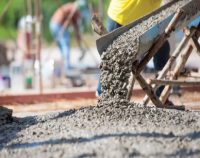Concrete Construction: 6 PDH
$36.00
Concrete is one of the most important construction materials. It is comparatively economical, easy to make, offers continuity and solidity, and will bond with other materials.
In this course the student will understand essentially all aspects of concrete construction including characteristics, mix design, formwork, joints, placement, finishing, and pre-cast. Instructor: Raymond Bosek, PE
SPECIFIC KNOWLEDGE OR SKILL OBTAINED
This course teaches the following specific knowledge and skills:
- Define characteristics of concrete
- Identify ingredients essential for good concrete
- Calculate concrete mix designs
- Determine methods and mixing times of concrete
- Describe the types of concrete forms and their construction
- Determine the types of ties for and placement of reinforcing steel
- Determine the location of construction joints
- Determine proper occasions for using the concrete saw
- Describe the proper procedures for placing concrete
- Describe the methods available for consolidating concrete
- Describe the finishing process for the final concrete surface
- Determine projects suitable for and lifting methods necessary for precast and tilt-up construction
CERTIFICATE OF COMPLETION
You will be able to immediately print a certificate of completion after passing a 21 question multiple-choice quiz. The quiz can be retaken unlimited times until a passing grade of 70% or better is earned. This course satisfies six professional development hours (PDH) of continuing education.
Related Courses
Design and Construction of Road Tunnels-Part 1 Planning: 5 PDH
$30.00 Add to cartIn this course the student will come to understand a general overview of the planning process of a road tunnel project, geometrical requirements and recommendations of new road tunnels, investigative techniques and parameters required for planning, construction and design of road tunnels, and the different types of reports required for a road tunnel project.Instructor: Raymond Bosek, PEIn this course the student will come to understand a general overview of the planning process of a road tunnel project, geometrical requirements and recommendations of new road tunnels, investigative techniques and parameters required for planning, construction and design of road tunnels, and the different types of reports required for a road tunnel project.SPECIFIC KNOWLEDGE OR SKILL OBTAINED
This course teaches the following specific knowledge and skills:
- General tunnel design parameters
- Alternative analyses
- Tunnel studies
- Operation and financial planning
- Geometric configurations
- Geotechnical investigations
- Geotechnical Reports
CERTIFICATE OF COMPLETION
You will be able to immediately print a certificate of completion after passing a 30 question multiple-choice quiz. The quiz can be retaken unlimited times until a passing grade of 70% or better is earned. This course satisfies five (5) professional development hours (PDH) of continuing education.
Preview CourseClick “Preview Course” to View Prior to PurchaseClick “Add to Cart” to Purchase and Access QuizStructural Design Criteria For Structures Other Than Buildings: 2 PDH
$12.00 Add to cartThis two hour online course establishes structural design criteria for structures other than buildings, furnishes design guidance for various types of structures, and identifies special considerations with regard to certain materials in specific applications. Structures other than buildings which are covered in this course include the following: bridges; dock and harbor facilities; drainage structures; bulk material structures; water and wastewater structures; and mechanical, electrical, and communication structures.Instructor: Raymond Bosek, PEThis two hour online course establishes structural design criteria for structures other than buildings, furnishes design guidance for various types of structures, and identifies special considerations with regard to certain materials in specific applications. Structures other than buildings which are covered in this course include the following: bridges; dock and harbor facilities; drainage structures; bulk material structures; water and wastewater structures; and mechanical, electrical, and communication structures. The course materials are based entirely on the Technical Manual TM 5-809-6/AFM 88-3 of Joint Departments of the Army and Air Force USA: Structural Design Criteria for Structures Other Than Buildings.
SPECIFIC KNOWLEDGE OR SKILL OBTAINED
This course teaches the following specific knowledge and skills:
- Know the common building materials used in construction
- Types of structures used in transportation, water & electrical distribution
- Support requirements for mechanical systems and bulk materials
- Design criteria for various types of structures
- Identify special considerations with regard to certain materials in specific applications.
CERTIFICATE OF COMPLETION
You will be able to immediately print a certificate of completion after passing a 15 question multiple-choice quiz. The quiz can be retaken unlimited times until a passing grade of 70% or better is earned. This course satisfies 2 professional development hours (PDH) of continuing education.
Preview CourseClick “Preview Course” to View Prior to PurchaseClick “Add to Cart” to Purchase and Access Quiz




